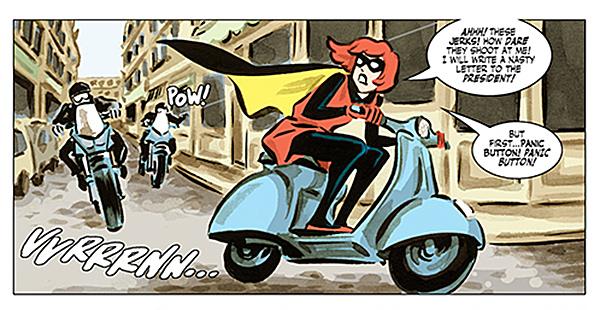THE TOUCAN INTERVIEW
APE Special Guest Colleen Coover, Part Two
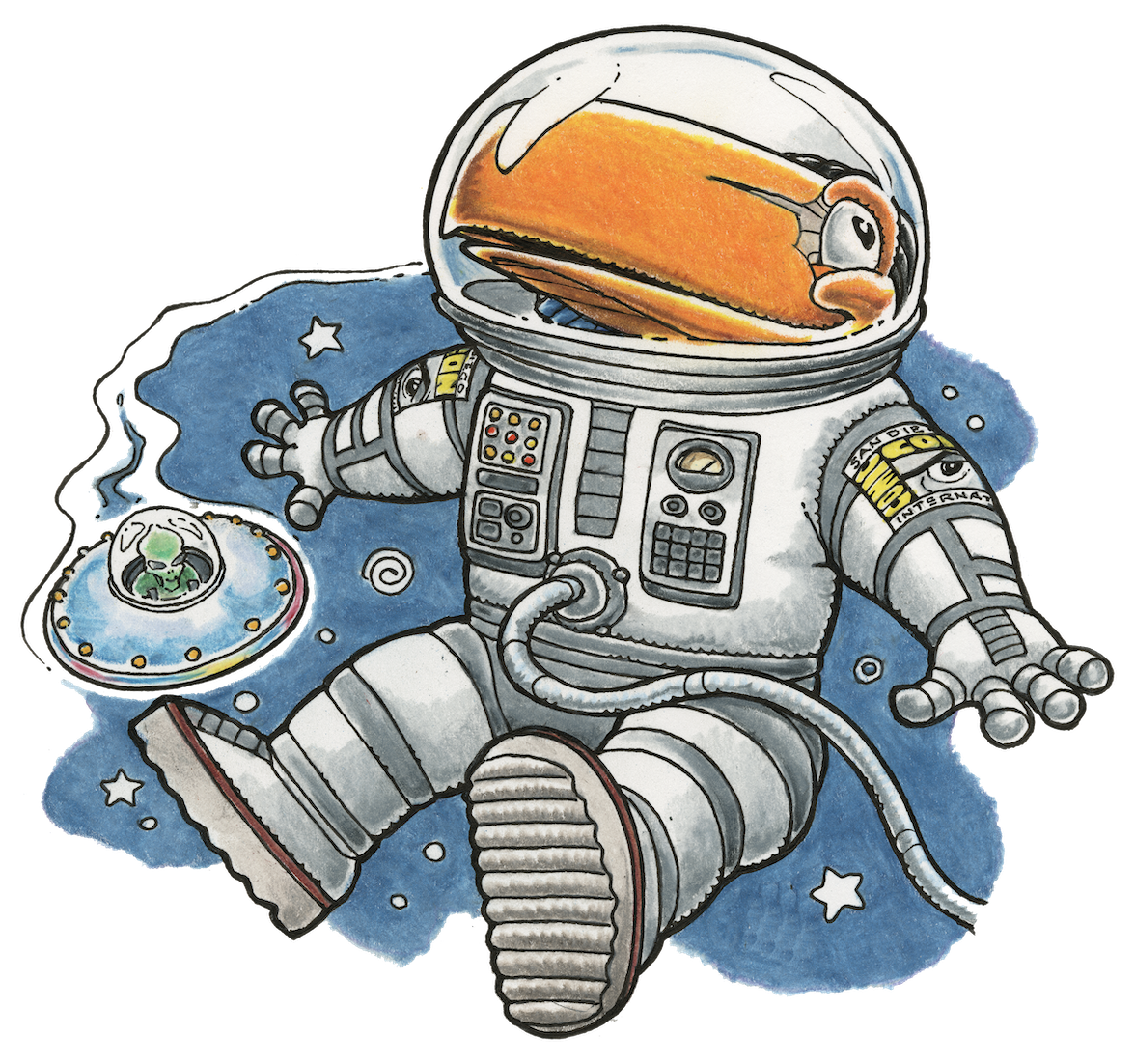
We continue our exclusive Toucan interview with cartoonist Colleen Coover. Colleen and her husband and collaborator, writer Paul Tobin, are special guests at APE 2013, October 12 & 13 at the Concourse Exhibition Center in San Francisco. In Part Two of the interview, Colleen talks about her Eisner Award-winning series Bandette, which won the 2013 Best Digital Comics Award. Colleen talks about how she and Paul work on the series, winning the Eisner, and plans for a Bandette collection in book form from Dark Horse, coming soon to a comic book store near you. Click here to read part one of our interview with Colleen!
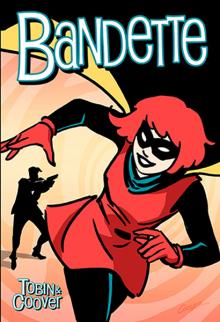
Toucan: How did Bandette get started?
Colleen: Basically, when the publishers of MonkeyBrain, Chris Roberson and Allison Baker, decided to get started, they asked us if we wanted to do a comic with them and we said yeah. And at the time we didn’t have any ideas. We were both doing other things and we had to finish those. And then sometime in the early spring of 2012 Paul and I were walking down the street and he asked me what I wanted to do and I said I feel like doing something kind of French, and he said okay, we’ll work with that. I had drawn this character on my sketch blog that I had named B. D. Belgique of the Sûreté, being the French Scotland Yard or whatever. And I was like I want to use that guy. I want to use this character that I had drawn for my sketch blog and then of course we were like there will be a teen girl in it, too. Paul was keen to do something sort of Nancy Drew-like but put Nancy Drew on her head and make her a thief. So that’s really where it came from, and the look of it is totally just everything we like from the ’60s and from good girl detectives and Tintin and European comics and heist films and things like that. It’s whatever we like, we throw in, like in a blender.
Toucan: And MonkeyBrain went for it?
Colleen: Oh, yeah! They didn’t ask us what we wanted to do or anything, they were just like, okay, that sounds great. It has never been, “We’d like you to do something for this sort of audience or that sort of audience,” they just said do whatever you want. They trusted us.
Toucan: So the fact that you were doing it digitally, did that open up a lot more doors for you when it came to the freedom of creating what you wanted?
Colleen: Well, it certainly took a lot of the pressure off. We knew that if we had gone to any traditional publisher with something like this, somebody somewhere along the line would have said, “Well, I’m not sure that that will sell, maybe if we did that or this . . .” We never had to worry about that. We never had to worry about whether or not it would sell because if it didn’t then fine, we’re out a couple of months of work, no big deal. If it did, that would be great; in the meantime we were having fun. We both believed wholeheartedly that anything we do should be for the audience of us. We create things that we want to read, and we’re of the firm belief that if you do that, then that will show through and other people will want to look at it too. But if we can’t satisfy ourselves, if we can’t have fun, then it’s not going to be fun for anyone else.
Toucan: What’s the collaborative process on this? Is there a full script to start off with?
Colleen: It is very much. Paul writes a full script and gives it to me and then I draw it. Occasionally, every once in a while we’ll discuss a way of phrasing something a little differently or a way of telling a story visually slightly differently but mostly I stick to full script. It’s easier that way.
Toucan: You were nominated for an Eisner Award for Best Coloring this year for Bandette. Your pages look like they’re scans of watercolor art on paper but they’re not, are they?
Colleen: No, they’re ink. It’s ink wash, which is something I learned in probably high school drawing class, but it’s basically watered down ink and then in Photoshop I have the scans of those inks basically on a layer. Photoshop has many layers; it’s like working on several different layers of paper and some of those layers you can make translucent, and then I color digitally underneath those inks. And yeah, I came up with this coloring style as a way to save time, because I didn’t want to spend a lot of time deciding what shade to make things or what color to make things. So by doing all the work in black and white with the inks for tone and stuff I saved myself a lot of work and it’s been a successful experiment. I’m very pleased, and it got nominated for an Eisner, which is cool.
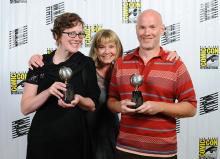
Toucan: But you won an Eisner Award, too . . . for Best Digital Comic.
Colleen: Yes, we did, which is great.
Toucan: What does that mean to you guys, besides obviously great?
Colleen: Well, it is obviously great. It was very exciting. Basically it meant that we got a little bit more attention for a few weeks. We got a few more offers of jobs from some people for a couple weeks, for a while. It was great. I’m still really excited and thrilled. Obviously it’s always been—since I started working in comics—it’s been this goal to get that sort of affirmation from my peers and there it is sitting on my shelf.
Toucan: You were nominated for four Eisner Awards, weren’t you?
Colleen: Digital, color, penciler/inker, and best new series. That one was a big deal for us to be nominated as a digital-only comic alongside some really great print comics.
Toucan: Did you see any kind of bump in sales because of the Eisner Award?
Colleen: We have not yet received sales for July. We did get a little bump when we were nominated, actually a pretty sizable bump when we were nominated.
Toucan: Is there a schedule you’re keeping to for Bandette? So many issues per year?
Colleen: Well, I don’t really have a schedule; it’s when we get it done. Because—and again, this is one of the advantages of digital—I’m never going to be able to keep a monthly schedule for anything. Because I did have to take a break, I had a project that I was contracted to do that had me taking some time off, and then I did the Batman ’66 story, which forced me to take some time off. So I just put my head down and work until I’m done, and then I turn in the art and then it gets published. So ideally it’s about six to eight weeks between issues. In reality it’s eight to nine, and that’s when nothing else is going on. I occasionally have to do work to make a little money, so I take these odd commercial jobs every once in a while, but mostly I’m just working on Bandette full time now.
Toucan: And do you see doing that for the foreseeable future?
Colleen: For the foreseeable future, yeah. We’re in a good spot right now. Paul is getting a lot of writing work, so we are able to have me concentrate on Bandette exclusively as far as comics go.
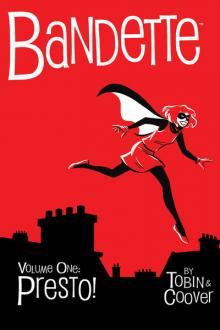
Toucan: Let’s talk about Dark Horse publishing Bandette in book form. That comes out in November, right?
Colleen:, I think the official release date is maybe November 10th or something like that. I think it’s going to be in November. I’m hoping to be able to have something for some sort of display for APE, but I don’t know.
Toucan: Does that collect the first four issues?
Colleen: The first five, which turned out to be a nice story arc, so that was handy.
Toucan: And there’s a lot of extras in it, too.
Colleen: There are a lot of extras. We had—again because I’m not the speediest artist in the world—we had a lot of our friends do guest two-page or three-page stories that were put up on the MonkeyBrain website, and we’re collecting most of them.
Toucan: From what you said before when we started talking about digital and not going to a publisher with this originally, is there a certain amount of irony in this now that it’s going to be published by a major publisher?
Colleen: Oh, not at all! We wanted that. That was part of the plan, because MonkeyBrain doesn’t take any print rights. They take worldwide digital rights for a certain amount of time, but they don’t take any print rights at all. So we were free to make whatever deal we wanted with whomever. We have a very good relationship with Dark Horse right now. Paul is doing a lot of writing for them and one of the editors there had seen Bandette and very actively pursued us to get it published through Dark Horse and it was the right company for it. Because we went with Dark Horse we were able to get it in hardcover, which was really important for us, and they have their own distribution and a really good marketing department. So we knew that we would get a lot of visibility out of being published with Dark Horse. So it’s good for everybody because they’ve got this year and a half of marketing already done with all the people who have already bought Bandette and it hasn’t been published in print yet, but it has an Eisner Award. So that works for everyone.
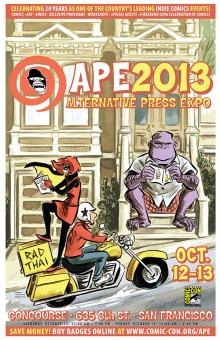
Toucan: You created the official APE poster for this year’s show. Let’s talk a little about that and the process behind that.
Colleen: I think you might be surprised at how small the art it, it’s only, it’s like 8.5 by 11 inches.
Toucan: And you just scan it at a really high DPI?
Colleen: I do, I scan it at 600 DPI and blow it up. I actually really enjoy blowing up my art rather then shrinking it down. For Bandette I work at six by nine, I work at print size and then I use air quotes around “print” because that’s the size that I send the file at, and that’s actually going to be the size that it publishes in print for Dark Horse. So yeah, I’m one of those weird artists that works small, like Robert Crumb. Let me just go ahead and compare myself to Robert Crumb in that way, that one way.
Toucan: The pages that we see in Bandette then are actually the finished pages that are colored. You’re doing them as whole pages, you’re not doing individual panels and scanning them in and reassembling them?
Colleen: No, I don’t have the patience for that.
Toucan: I don’t know why I thought that for a second, but it seems awfully small to do a nine-panel grid.
Colleen: I do enjoy a nine-panel grid. For Bandette, I think that was a conscious decision for the digital format was that I would do three-tier pages for all the pages and so I have a template now that I use. After four issues I figured out, “Oh, I can do a template of this so I don’t have to measure it out for each page.” But because of that it reproduces nicely on a phone. It might not be ideal on the phone, I think it’s ideal on a tablet, but on a phone it works nicely because none of the panels are going to be really, really tall and therefore have to be shrunk down so small that you can’t read them as one piece.
Toucan: Did you have to do it differently for the Batman ’66 story, because it seems to me that they work kind of in a half-page format?
Colleen: They do work in a half-page format and I did that, but it was griddy. It was a grid.
Toucan: Was that a big adjustment for you?
Colleen: No, not really. I’m using my clean art style for clean inks and really saturated colors as opposed to the wash and the more pastel colors that I use in Bandette, because it didn’t seem appropriate to go into the sort of camp adventure of Batman ’66 with understated ink wash. I figured brash was good, so that’s where I went.
Toucan: Are you going to be selling any of your Bandette original pages?
Colleen: I will not be. I’m not a big seller of my original art. Part of the problem is I have a husband who’s an art collector and he doesn’t like to let them go and I don’t like to let them go. Usually, if I sell something I’m like, “Ah . . . it’s gone.” I won’t think about it anymore. But he is very possessive of our art and I think rightly so. So it coincides nicely with my reluctance to sell. So no, we hang on to the originals.
Toucan: What comics and creators do you follow now?
Colleen: Oh, not a lot. I find myself doing less and less looking to see what’s current, and part of that is just exhaustion at the end of the day, comic book exhaustion. I’m really, really keen on Jeremy Bastian’s Cursed Pirate Girl. They’re so beautiful and unique and wonderful, it’s hard not to fall in love with. I read a couple of webcomics occasionally, mostly Aguas because it’s so funny. I just sort of look around and keep my hand in here and there but there’s nothing. Oh and I have a subscription to Batman ’66 of course, so I read that every week. I think part of it is that, especially with the superhero stuff, it’s not made for me. I’m not the market they’re after. Batman ’66 is me, I am that market, and again that’s part of the reason that I went into it because that’s what I want to read.
Toucan: What do you enjoy about going to conventions and events like APE and Comic-Con?
Colleen: Part of it is the whole comic book club, linking up with the friends that you haven’t seen since the last show. But I really do enjoy connecting with the people who come around and particularly the people who have read my work, but also the people who haven’t seen it before and want to know what they’re looking at. I really just like being able to talk about comics with people. But a large part of it is that is it’s also the time that I get to see new things. Whenever we go to shows we will generally pick up a handful of comics from people we’ve never met before, anything that looks interesting, that’s when we’ll discover new things. Like I said Jeremy Bastian; we picked up Cursed Pirate Girl at a show.
Toucan: Our last question was going to be what’s next for you, but I think Bandette is next for you?
Colleen: Yeah . . . it is for the near future, for sure. Paul and I are writing something but it’s for another company and I don’t think they want us talking about it yet. So it’s one of those interviews where it’s oh I have this thing that I’m working on but I can’t tell you about it right now.
Toucan: Maybe by the time APE rolls around and you have your Spotlight panel maybe you can.
Colleen: Yeah, hopefully that’s true!
Meet Colleen Coover and Paul Tobin at APE 2013, October 12 and 13 at the Concourse Exhibition Center in San Francisco! Click here to buy your badges now!
